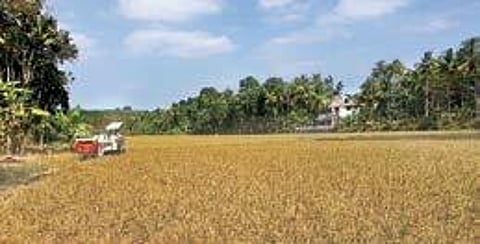

KOCHI: When talks about the centenary celebrations of Kakkatupara LP School at Kolenchery came up, Reji M Paul, an entrepreneur and former computer engineer, thought of a novel method for paying tribute to his alma mater.
He suggested reviving the expanse of barren agriculture land near the school and thus the Kakkatupara Nellutpadathaka Padashekhara Samithi was formed. It has been six years since then and the collective is getting ready for their sixth successful paddy harvest. The cultivation is done using a natural farming method, which is not to be confused with organic farming. While the latter uses organic pesticides, natural farming is completely dependent on natural materials to sustain the cultivation. They have cultivated 10 acres of land, with an average yield of two tonnes per acre.
“There is no reduction in yield as compared to the conventional method. Natural farming is the way to go in the age of lifestyle diseases. Pesticides might kill unwanted organisms, but a lot of beneficial insects and micro-organisms too are lost in the process. We also sell our produce, in the form of unpolished brown rice which is high in nutrient value,” said Reji. They were guided by K M Hilal, who has worked with various celebrities in the state for natural farming.
Under this method, the seeds are prepared for cultivation, following which the land is taken care of.
After sowing, young saplings are nourished. All this is done using three mixes- jeevamritham, kharamritham and beejamritham. These are essentially a mix of cow dung and cow urine in various proportions mixed with materials such as gram powder, ripe fruits etc.
“Before sowing, we check the pH balance of the soil and rectify it if needed. Everything is scientific, to ensure optimum results. Our fields now are a healthy ecosystem sustaining frogs, small fishes, crabs and earthworms,” said Reji.
The various practices of the method are intriguing. For example, coconut water is sprayed on young rice plants to get uniform growth. Various ecological engineering techniques are used to get rid of bugs at the flowering stage of rice. To get rid of beetle, Ceylon slitwort (thumba flower) is planted or a solution of rotten sardines are used. The panchayat too has expressed interest in adopting the cultivation for larger areas. The district panchayat provides various infrastructure support for the collective.